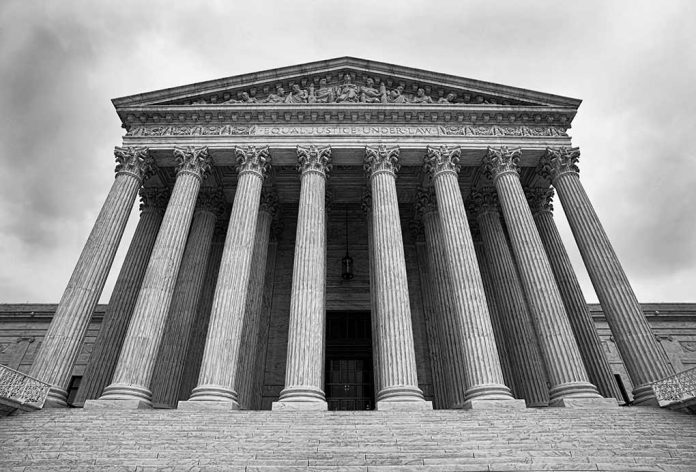
The Supreme Court declined to review New York’s Concealed Carry Improvement Act while also upholding federal regulations on ghost guns, delivering a blow to Second Amendment advocates fighting against restrictive state gun laws.
Key Takeaways
- The Supreme Court refused to hear challenges to New York’s gun restrictions on “sensitive locations” and “good moral character” requirements for concealed carry permits.
- The Court’s decision maintains provisions allowing New York to ban firearms in public transportation, hospitals, schools, and other designated locations.
- The Court separately upheld Biden administration regulations on “ghost guns” in Garland v. VanDerStok, expanding ATF authority over gun parts and kits.
- Certain provisions of New York’s law were previously struck down by lower courts, including mandatory disclosure of social media accounts and carrying on private property without consent.
- The case stems from New York’s response to the 2022 Bruen decision that overturned previous century-old concealed carry restrictions.
New York Gun Restrictions Stand After Supreme Court Passes on Challenge
The U.S. Supreme Court declined to hear a challenge to New York’s Concealed Carry Improvement Act, effectively allowing the state to continue enforcing restrictions on where firearms can be carried and who can obtain concealed carry permits. The law, enacted in 2022 after the Court’s landmark ruling in New York State Rifle & Pistol Association v. Bruen, designates numerous “sensitive locations” as gun-free zones and requires handgun license applicants to demonstrate “good moral character.”
The Court offered no explanation for its decision not to take up the case, which leaves in place a ruling from the 2nd Circuit Court of Appeals. That ruling upheld key provisions of the law while striking down others. Specifically, the appeals court allowed New York to enforce bans on firearms in sensitive locations such as public transportation, hospitals, schools, and entertainment venues, while also permitting the state to require proof of “good moral character” from handgun license applicants.
WASHINGTON: The Supreme Court declined to hear a challenge to New York’s gun law, leaving in place restrictions on concealed carry in “sensitive locations” like public transit, parks, hospitals, schools, houses of worship, and entertainment venues. pic.twitter.com/tCFLfXCIV0
— KolHaolam (@KolHaolam) April 8, 2025
Restrictions and Requirements Under New York’s Law
The Concealed Carry Improvement Act created an extensive list of “sensitive locations” where firearms are prohibited, even with a permit. These locations include government buildings, health care facilities, places of worship, libraries, playgrounds, parks, zoos, schools, colleges, public transportation, establishments serving alcohol, theaters, concert venues, and Times Square. The law effectively creates numerous gun-free zones throughout New York City and the state.
In addition to location restrictions, the law instituted requirements for applicants to provide character references and family contact information. While these provisions remain in effect, the appeals court did strike down some aspects of the law. Specifically, the court blocked requirements for applicants to disclose their social media accounts and ruled against making it a crime to carry a concealed weapon on private property without the owner’s explicit consent.
Ghost Gun Regulations Also Upheld
In a separate but related decision, the Supreme Court upheld Biden administration regulations on so-called “ghost guns” in the case Garland v. VanDerStok. This ruling allows the Bureau of Alcohol, Tobacco, Firearms and Explosives (ATF) to enforce Final Rule 2021-05F, which redefined “firearm” to include partially completed pistol frames and other gun parts. The rule targets the rise of untraceable homemade firearms assembled from kits or individual components.
The Court has shown selectivity in which gun law challenges it takes up. In recent terms, it has upheld restrictions on gun possession for individuals subject to domestic violence restraining orders while rejecting challenges to state laws regulating firearms in various contexts. The pattern suggests the Court is allowing some restrictions to stand while maintaining its broader framework established in the Bruen decision, which requires gun regulations to be consistent with the nation’s historical tradition of firearm regulation.
Sources:
Supreme Court declines to hear challenge to New York’s ban on guns in ‘sensitive’ locations
Supreme Court won’t hear challenge to New York’s ‘sensitive locations’ gun control law
SCOTUS Declines Challenge to New York Concealed Carry Restrictions



